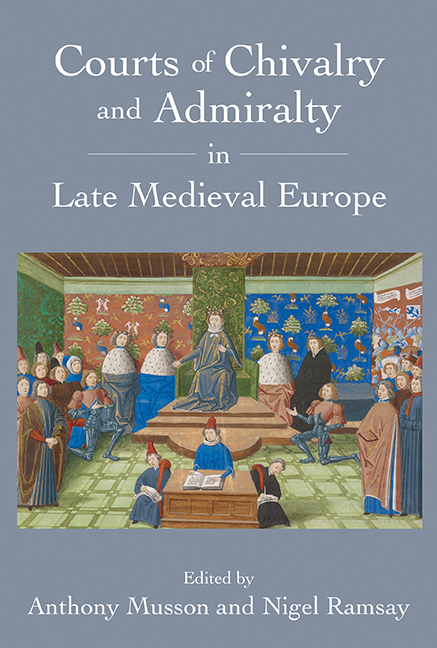Book contents
- Frontmatter
- Contents
- List of Illustrations
- Notes on Contributors
- Preface
- A Note on Editorial Practice
- List of Abbreviations
- Introduction
- Chapter 1 Heralds and the Court of Chivalry: From Collective Memory to Formal Institutions
- Chapter 2 French Armorial Disputes and Controls
- Chapter 3 Art, Objects and Ideas in the Records of the Medieval Court of Chivalry
- Chapter 4 Sir Robert Grosvenor and the Scrope–Grosvenor Controversy
- Chapter 5 From Brittany to the Black Sea: Nicholas Sabraham and English Military Experience in the Fourteenth Century
- Chapter 6 ‘Armed and redy to come to the felde’: Arming for the Judicial Duel in Fifteenth-Century England
- Chapter 7 The Jurisdiction of the Constable and Marshals of France in the Later Middle Ages
- Chapter 8 The Origins and Jurisdiction of the English Court of Admiralty in the Fourteenth Century
- Chapter 9 The Consulate of the Sea and its Fortunes in Late Medieval Mediterranean Countries
- Chapter 10 The Admiralty and Constableship of England in the Later Fifteenth Century: The Operation and Development of these Offices, 1462–85, under Richard, Duke of Gloucester and King of England
- Chapter 11 Some Dubious Beliefs about Medieval Prize Law
- index
Chapter 9 - The Consulate of the Sea and its Fortunes in Late Medieval Mediterranean Countries
Published online by Cambridge University Press: 28 June 2018
- Frontmatter
- Contents
- List of Illustrations
- Notes on Contributors
- Preface
- A Note on Editorial Practice
- List of Abbreviations
- Introduction
- Chapter 1 Heralds and the Court of Chivalry: From Collective Memory to Formal Institutions
- Chapter 2 French Armorial Disputes and Controls
- Chapter 3 Art, Objects and Ideas in the Records of the Medieval Court of Chivalry
- Chapter 4 Sir Robert Grosvenor and the Scrope–Grosvenor Controversy
- Chapter 5 From Brittany to the Black Sea: Nicholas Sabraham and English Military Experience in the Fourteenth Century
- Chapter 6 ‘Armed and redy to come to the felde’: Arming for the Judicial Duel in Fifteenth-Century England
- Chapter 7 The Jurisdiction of the Constable and Marshals of France in the Later Middle Ages
- Chapter 8 The Origins and Jurisdiction of the English Court of Admiralty in the Fourteenth Century
- Chapter 9 The Consulate of the Sea and its Fortunes in Late Medieval Mediterranean Countries
- Chapter 10 The Admiralty and Constableship of England in the Later Fifteenth Century: The Operation and Development of these Offices, 1462–85, under Richard, Duke of Gloucester and King of England
- Chapter 11 Some Dubious Beliefs about Medieval Prize Law
- index
Summary
In this chapter I outline very summarily the long history of the text known as the Llibre del Consolat de mar [Consulate of the Sea] (in Italian, Libro del Consolato del mare), from its very origins in the time of the Aragonese Crown through to its fortunes in the sixteenth century across Europe, especially in the Mediterranean area. Italy will be a crucial focus of analysis: indeed, if we examine the extant manuscripts and printed copies of the Llibre, Italy seems to be the most important area of the text's circulation at the end of the Middle Ages. One of the seven manuscripts of the Llibre dating from before the editio princeps (1484) is preserved at the Biblioteca Universitaria of Cagliari, while another library, in Palermo, has an early manuscript translation into Italian, dating back to 1479. The Llibre was printed in eight different Catalan editions, in Barcelona, in the fifteenth and sixteenth centuries; during the same period the text appeared in nine Italian editions, in Rome and Venice. Of these latter, in 1519 an edition was printed in Rome but with a dedicatory prologue referring to the Florentine merchant community, and this was the first printed translation of the Llibre from Catalan. Even the later French edition (1577) depended on an Italian translation. As a consequence, the use and fortune of the Llibre del Consolat is, above all, part of the history of economic, political and cultural relations between Italy and the Iberian world,5 within the general evolution of the western Mediterranean
- Type
- Chapter
- Information
- Courts of Chivalry and Admiralty in Late Medieval Europe , pp. 179 - 194Publisher: Boydell & BrewerPrint publication year: 2018

